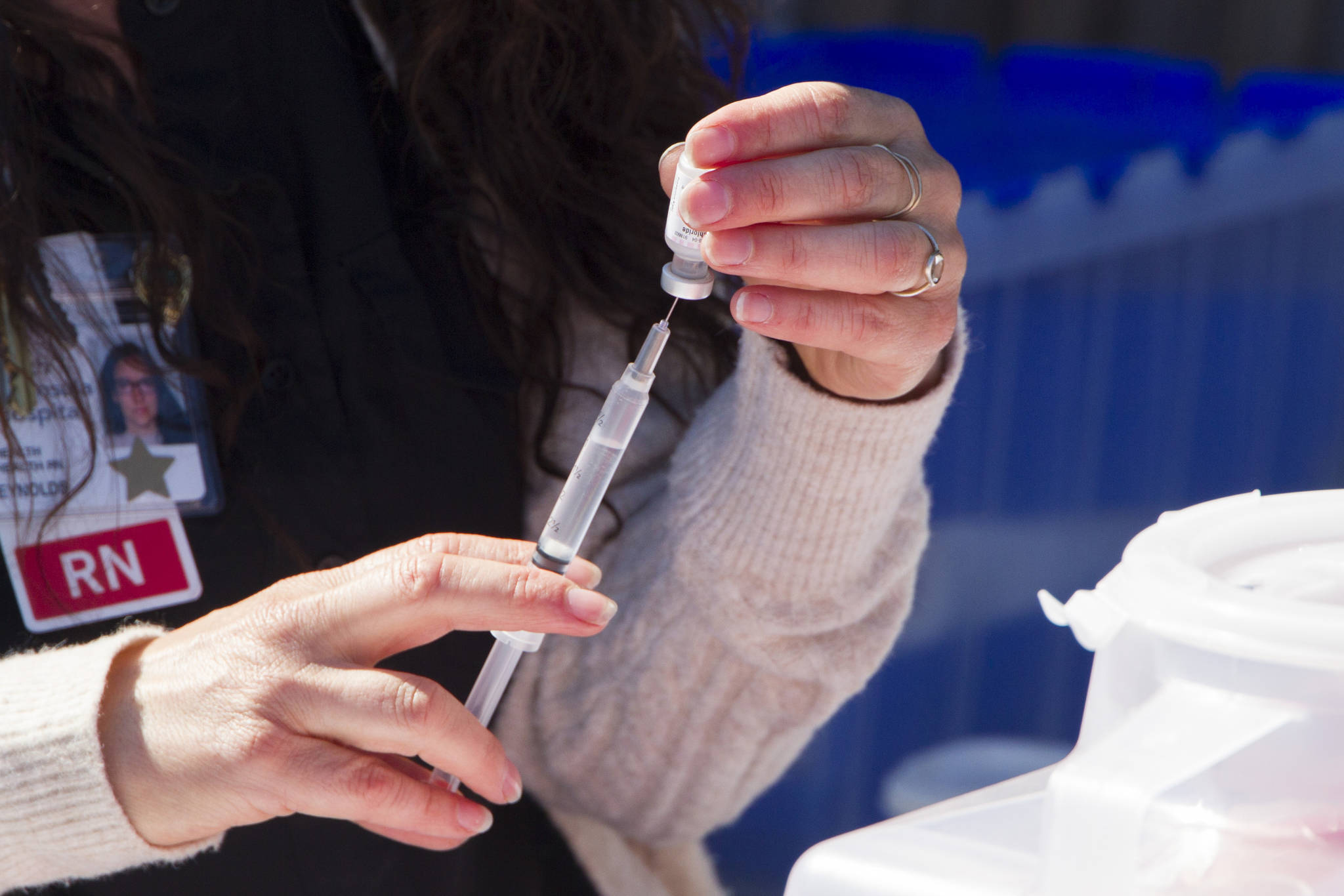Misinformation about the effectiveness of COVID-19 vaccines and treatment options have been circulating the state for the past year, and health officials with the Department of Health and Social Services continue to reiterate the same message: Vaccines are the way out of this pandemic.
Dr. Coleman Cutchins, a clinical pharmacist with the state, said during a news briefing Thursday that while treating COVID-19 is possible, it’s difficult — and options are relatively scarce.
“Monoclonal antibodies are recommended by guidelines,” Cutchins said. “They’re the only therapeutic that has shown benefit in treating patients not admitted to the hospital.”
There is a caveat, however. Once a COVID-19-positive patient’s symptoms worsen, the antibody treatment isn’t as effective.
“They really have to be given early though, which is why it’s important to get tested,” Cutchins said Thursday. “Because if you don’t get tested you don’t know you’re positive, and if you don’t know you’re positive you can’t get monoclonal.”
Earlier in the pandemic, Cutchins said there was a lot of chatter about other possible COVID-19 treatments like ivermectin and hydroxychloroquine, which have since been deemed as ineffective.
“There are some observational things, (but) that isn’t really scientific method,” he said. “The scientific trials haven’t shown any benefits.”
During a Kenai Peninsula Borough Assembly meeting last Tuesday night, while a representative of Central Peninsula Hospital presented a quarterly hospital report, Borough Mayor Charlie Pierce — who conceded that he is not a medical expert — defended the use of both ivermectin and hydroxychloroquine.
But according to the U.S. Food and Drug Administration, ivermectin — which is not an antiviral drug — has not been approved for use in treating or preventing COVID-19. It is used on animals, and sometimes topically for some parasitic worms like lice.
“There seems to be a growing interest in a drug called ivermectin to treat humans with COVID-19,” the FDA website states. “Ivermectin is often used in the U.S. to treat or prevent parasites in animals.”
Cutchins said the hype surrounding ivermectin as a type of COVID treatment was interesting.
“I’m kind of amazed how excited people have gotten over ivermectin for all this, but, unfortunately, (there’s) not really a benefit,” he said Thursday.
Additionally, the effectiveness of hydroxychloroquine was called in to question by the FDA just a month after the pandemic began after the administration cited that there had been “reports of serious heart rhythm problems in patients with COVID-19” and that the drug had “not been shown to be safe and effective for treating or preventing COVID-19.”
Remdesivir is another antiviral drug that has generated a lot of interest as a possible COVID-19 treatment option.
According to a report from the National Institutes of Health in April, remdesivir was shown to have reduced time in clinical recovery for patients with severe COVID-19, but there was no observed benefit for patients with mild or moderate illness.
Cutchins said remdesivir is controversial “because it doesn’t show great benefit,” and likened the drug to steroids.
“They are better than nothing but they’re not totally life-saving medications for all of the people that get it,” he said.
Cutchins reiterated that the FDA-approved COVID vaccines are still proven to be the most effective tool the public has in curbing the spread and severity of the virus.
“I have to remind people that vaccines are the way we treat viruses,” he said. “Vaccines have saved more lives than antibiotics.”
DHSS officials also disputed claims of vaccine-caused death and miscarriage rates during Thursday’s press briefing.
Matthew Bobo, the state immunization program manager, said there have been zero confirmed deaths associated with or attributed to any of the COVID-19 vaccines.
Regarding COVID vaccination while pregnant, Dr. Lisa Rabinowitz — a staff physician with the state — said Thursday that data doesn’t indicate a higher rate of miscarriage.
“We’re very encouraged by that,” she said. “We now have two great ways to protect your newborn because we know the antibodies are passed through the bloodstream and also through breast milk.”
According to the Associated Press, the American College of Obstetricians and Gynecologists is now recommending the COVID-19 vaccine for pregnant people following data that shows contracting the virus while still carrying can increase the risks for severe complications and preterm birth.
“We know you’re at high risk for both yourself and your infant if you get COVID, so please get vaccinated,” Rabinowitz said.
State officials urge Alaskans to get their COVID shots, especially as the delta variant continues to impact communities across the state.
“Things like masking (and) distancing are good, temporary measures when we’ve got a lot of cases spreading and moving,” Chief Medical Officer Dr. Anne Zink said Thursday. “Vaccines are a much better, longer-term solution to that.”
• Reach reporter Camille Botello at camille.botello@peninsulaclarion.com.

